(完整版)《情态动词can与could的用法》知识点(可编辑修改word版)
- 格式:docx
- 大小:12.56 KB
- 文档页数:4
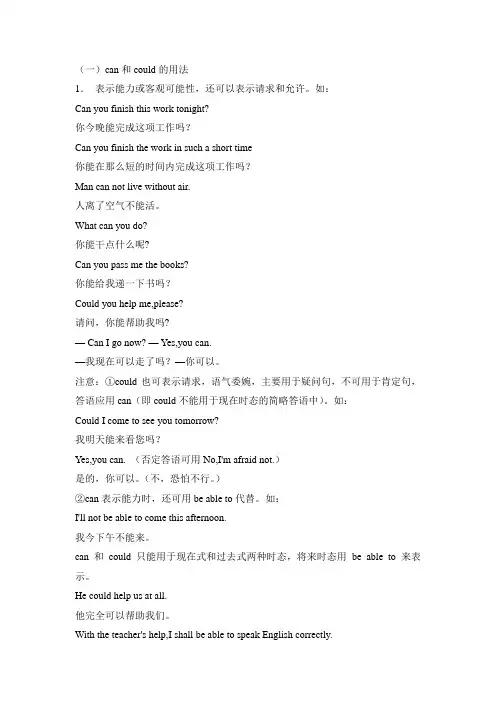
(一)can和could的用法1.表示能力或客观可能性,还可以表示请求和允许。
如:Can you finish this work tonight?你今晚能完成这项工作吗?Can you finish the work in such a short time你能在那么短的时间内完成这项工作吗?Man can not live without air.人离了空气不能活。
What can you do?你能干点什么呢?Can you pass me the books?你能给我递一下书吗?Could you help me,please?请问,你能帮助我吗?— Can I go now? — Yes,you can.—我现在可以走了吗?—你可以。
注意:①could也可表示请求,语气委婉,主要用于疑问句,不可用于肯定句,答语应用can(即could不能用于现在时态的简略答语中)。
如:Could I come to see you tomorrow?我明天能来看您吗?Yes,you can. (否定答语可用No,I'm afraid not.)是的,你可以。
(不,恐怕不行。
)②can表示能力时,还可用be able to代替。
如:I'll not be able to come this afternoon.我今下午不能来。
can 和could 只能用于现在式和过去式两种时态,将来时态用be able to 来表示。
He could help us at all.他完全可以帮助我们。
With the teacher's help,I shall be able to speak English correctly.由于老师的帮助,我将能准确地讲英语。
2. “can”表达推测例:Can the news be true? 这消息会是真的吗?The news can't be true. 这消息不会是真的吧。
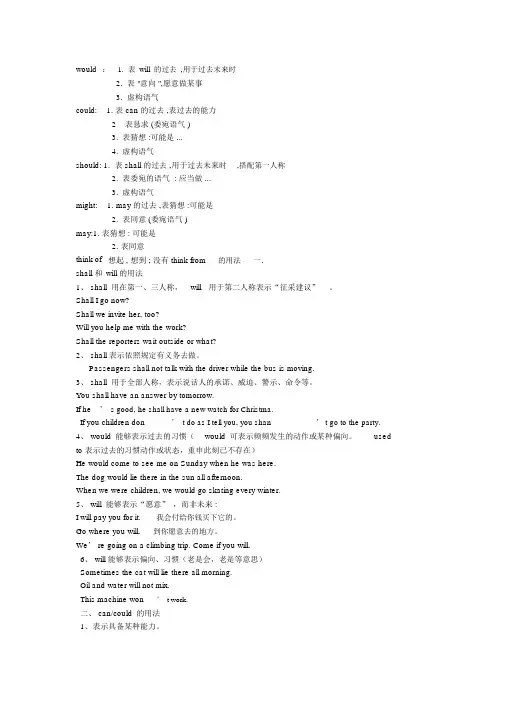
would: 1.表will的过去,用于过去未来时2.表 "意向 ",愿意做某事3.虚构语气could: 1. 表 can 的过去 ,表过去的能力2表恳求 (委宛语气 )3.表猜想 :可能是 ...4.虚构语气should: 1. 表 shall 的过去 ,用于过去未来时,搭配第一人称2.表委宛的语气 : 应当做 ...3.虚构语气might: 1. may 的过去 ,表猜想 :可能是2.表同意 (委宛语气 )may:1. 表猜想 : 可能是think of shall 和2. 表同意想起 , 想到 ; 没有 think fromwill 的用法的用法一.1、 shall 用在第一、三人称,will用于第二人称表示“征采建议”。
Shall I go now?Shall we invite her, too?Will you help me with the work?Shall the reporters wait outside or what?2、 shall 表示依照规定有义务去做。
Passengers shall not talk with the driver while the bus is moving.3、 shall 用于全部人称,表示说话人的承诺、威迫、警示、命令等。
You shall have an answer by tomorrow.If he’ s good, he shall have a new watch for Christma.If you children don’ t do as I tell you, you shan’ t go to the party. 4、 would 能够表示过去的习惯(would 可表示频频发生的动作或某种偏向。
used to 表示过去的习惯动作或状态,重申此刻已不存在)He would come to see me on Sunday when he was here.The dog would lie there in the sun all afternoon.When we were children, we would go skating every winter.5、 will 能够表示“愿意” ,而非未来 :I will pay you for it.我会付给你钱买下它的。
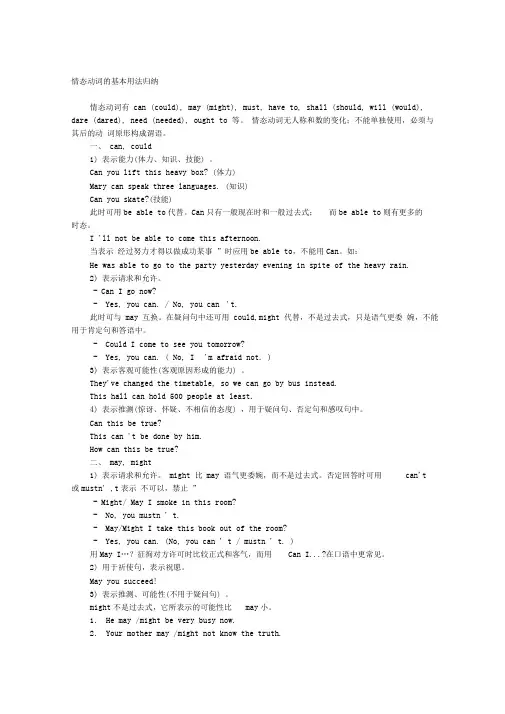
情态动词的基本用法归纳情态动词有can (could), may (might), must, have to, shall (should, will (would), dare (dared), need (needed), ought to 等。
情态动词无人称和数的变化;不能单独使用,必须与其后的动词原形构成谓语。
一、can, could1)表示能力(体力、知识、技能) 。
Can you lift this heavy box? (体力)Mary can speak three languages. (知识)Can you skate?(技能)此时可用be able to代替。
Can只有一般现在时和一般过去式;而be able to则有更多的时态。
I 'll not be able to come this afternoon.当表示经过努力才得以做成功某事”时应用be able to,不能用Can。
如:He was able to go to the party yesterday evening in spite of the heavy rain.2)表示请求和允许。
- Can I go now?- Yes, you can. / No, you can 't.此时可与may 互换。
在疑问句中还可用could,might 代替,不是过去式,只是语气更委婉,不能用于肯定句和答语中。
- Could I come to see you tomorrow?- Yes, you can. ( No, I 'm afraid not. )3)表示客观可能性(客观原因形成的能力) 。
They've changed the timetable, so we can go by bus instead.This hall can hold 500 people at least.4)表示推测(惊讶、怀疑、不相信的态度) ,用于疑问句、否定句和感叹句中。
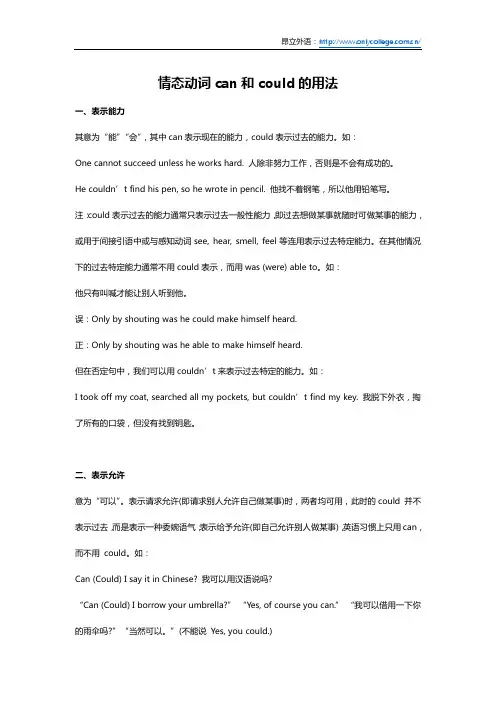
情态动词can和could的用法一、表示能力其意为“能”“会”,其中can表示现在的能力,could表示过去的能力。
如:One cannot succeed unless he works hard. 人除非努力工作,否则是不会有成功的。
He couldn’t find his pen, so he wrote in pencil. 他找不着钢笔,所以他用铅笔写。
注:could表示过去的能力通常只表示过去一般性能力,即过去想做某事就随时可做某事的能力,或用于间接引语中或与感知动词see, hear, smell, feel等连用表示过去特定能力。
在其他情况下的过去特定能力通常不用could表示,而用was (were) able to。
如:他只有叫喊才能让别人听到他。
误:Only by shouting was he could make himself heard.正:Only by shouting was he able to make himself heard.但在否定句中,我们可以用couldn’t来表示过去特定的能力。
如:I took off my coat, searched all my pockets, but couldn’t find my key. 我脱下外衣,掏了所有的口袋,但没有找到钥匙。
二、表示允许意为“可以”。
表示请求允许(即请求别人允许自己做某事)时,两者均可用,此时的could 并不表示过去,而是表示一种委婉语气;表示给予允许(即自己允许别人做某事),英语习惯上只用can,而不用could。
如:Can (Could) I say it in Chinese? 我可以用汉语说吗?“Can (Could) I borrow your umbrella?” “Yes, of course you can.” “我可以借用一下你的雨伞吗?”“当然可以。
”(不能说Yes, you could.)注:以上说的是针对现在或将来情况而言的,若谈的是过去情况,则过去could只用于表示过去一般性允许(即表示某人随时都可以做某事),而不表示特定的允许(即表示在过去某一特定情况下允许进行某一特定的活动),遇此情况需换成其他表达。
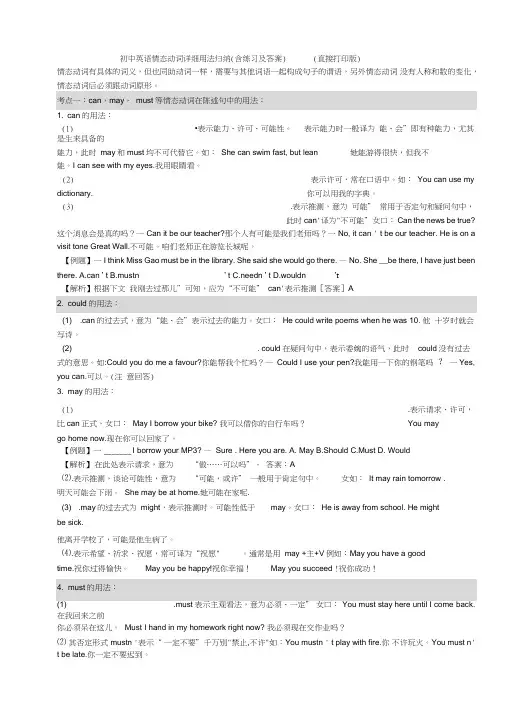
初中英语情态动词详细用法归纳(含练习及答案) (直接打印版)情态动词有具体的词义,但也同助动词一样,需要与其他词语一起构成句子的谓语,另外情态动词没有人称和数的变化,情态动词后必须跟动词原形。
1. can的用法:(1)•表示能力、许可、可能性。
表示能力时一般译为能、会”即有种能力,尤其是生来具备的能力,此时may和must均不可代替它。
如:She can swim fast, but lean 她能游得很快,但我不能。
I can see with my eyes.我用眼睛看。
(2)表示许可,常在口语中。
如:You can use my dictionary. 你可以用我的字典。
(3).表示推测,意为可能” 常用于否定句和疑问句中,此时can'译为"不可能”女口:Can the news be true?这个消息会是真的吗?一Can it be our teacher?那个人有可能是我们老师吗?一No, it can ' t be our teacher. He is on a visit tone Great Wall.不可能。
咱们老师正在游览长城呢。
【例题】一I think Miss Gao must be in the library. She said she would go there. —No. She __be there, I have just beenthere. A.can ' t B.mustn ' t C.needn ' t D.wouldn 't【解析】根据下文我刚去过那儿”可知,应为“不可能” can'表示推测[答案]A(1) .can的过去式,意为“能、会”表示过去的能力。
女口:He could write poems when he was 10. 他十岁时就会写诗。
(2) . could在疑问句中,表示委婉的语气,此时could没有过去式的意思。
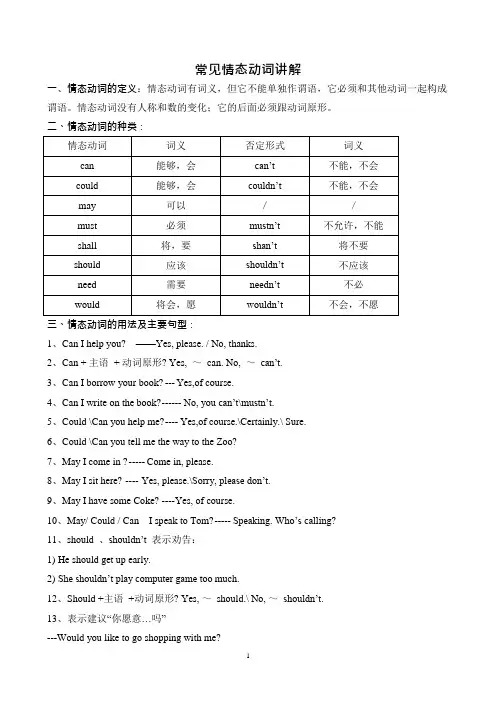
常见情态动词讲解一、情态动词的定义:情态动词有词义,但它不能单独作谓语,它必须和其他动词一起构成谓语。
情态动词没有人称和数的变化;它的后面必须跟动词原形。
二、情态动词的种类:三、情态动词的用法及主要句型:1、Can I help you? ——Yes, please. / No, thanks.2、Can + 主语+ 动词原形? Yes, ~can. No, ~can’t.3、Can I borrow your book? --- Yes,of course.4、Can I write on the book? ------ No, you can’t\mustn’t.5、Could \Can you help me? ---- Yes,of course.\Certainly.\ Sure.6、Could \Can you tell me the way to the Zoo?7、May I come in ? ----- Come in, please.8、May I sit here? ---- Yes, please.\Sorry, please don’t.9、May I have some Coke? ---- Y es, of course.10、May/ Could / Can I speak to Tom? ----- Speaking. Who’s calling?11、should 、shouldn’t表示劝告:1)He should get up early.2)She shouldn’t play computer game too much.12、Should +主语+动词原形? Yes, ~should.\ No, ~shouldn’t.13、表示建议“你愿意…吗”---Would you like to go shopping with me?---Yes, I’d love to. /I’d love to. But I’m busy now.14、就餐用语Would you like something to eat\drink? ---- Y es, I’d like…15、shall 用于第一人称(I, we), 可以表示“将”和表示建议“……好吗?”1)Where shall we have dinner?2)Shall we go fishing? ----- A ll right. \OK. \Good idea.16、Must + 主语+ 动词原形? ---Yes,~must.\No, ~needn’t.四.常见情态动词的区别:1.can (could)1)表示能力,could 主要指过去时间。
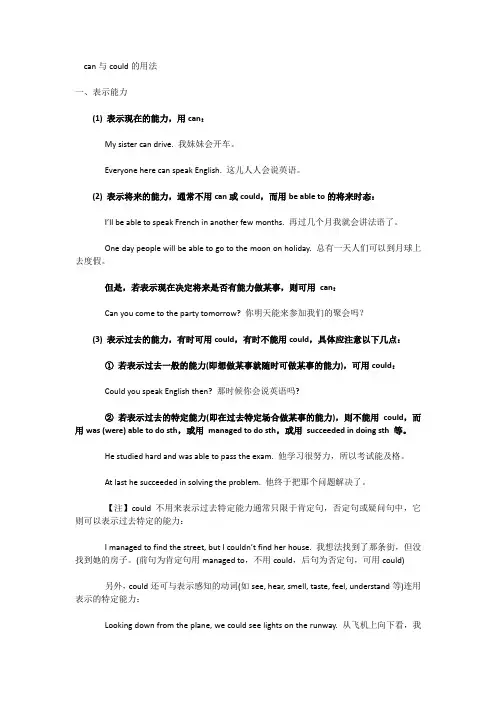
can与could的用法一、表示能力(1) 表示现在的能力,用can:My sister can drive. 我妹妹会开车。
Everyone here can speak English. 这儿人人会说英语。
(2) 表示将来的能力,通常不用can或could,而用be able to的将来时态:I’ll be able to speak French in another few months. 再过几个月我就会讲法语了。
One day people will be able to go to the moon on holiday. 总有一天人们可以到月球上去度假。
但是,若表示现在决定将来是否有能力做某事,则可用can:Can you come to the party tomorrow? 你明天能来参加我们的聚会吗?(3) 表示过去的能力,有时可用could,有时不能用could,具体应注意以下几点:①若表示过去一般的能力(即想做某事就随时可做某事的能力),可用could:Could you speak English then? 那时候你会说英语吗?②若表示过去的特定能力(即在过去特定场合做某事的能力),则不能用could,而用was (were) able to do sth,或用managed to do sth,或用succeeded in doing sth 等。
He studied hard and was able to pass the exam. 他学习很努力,所以考试能及格。
At last he succeeded in solving the problem. 他终于把那个问题解决了。
【注】could 不用来表示过去特定能力通常只限于肯定句,否定句或疑问句中,它则可以表示过去特定的能力:I managed to find the street, but I couldn’t find her house. 我想法找到了那条街,但没找到她的房子。
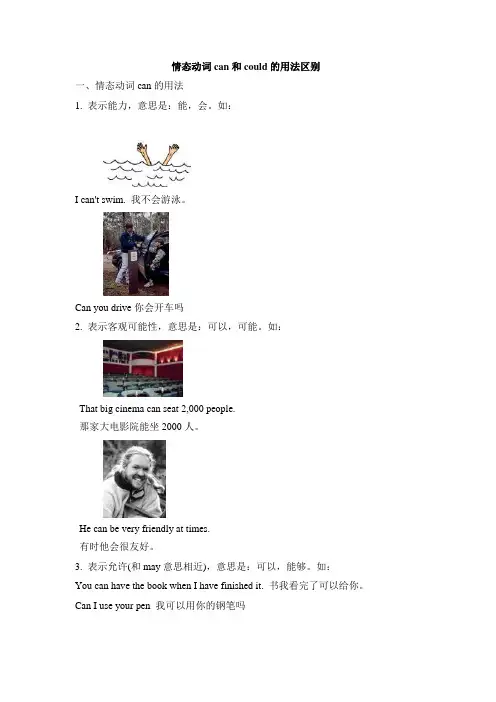
情态动词can和could的用法区别一、情态动词can的用法1. 表示能力,意思是:能,会。
如:I can't swim. 我不会游泳。
Can you drive你会开车吗2. 表示客观可能性,意思是:可以,可能。
如:That big cinema can seat 2,000 people.那家大电影院能坐2000人。
He can be very friendly at times.有时他会很友好。
3. 表示允许(和may意思相近),意思是:可以,能够。
如:You can have the book when I have finished it. 书我看完了可以给你。
Can I use your pen 我可以用你的钢笔吗4. 表示惊异、不相信等(用于疑问句、否定句或感叹句中),意思是:会,可能。
如:This can't be true. 这不可能是真的。
Can it be true 这可能是真的吗二、情态动词could的用法1. 表示“能力”或“可能性”,作为can的过去形式。
如:Could you speak English then 那时你能讲英语吗He said he couldn't follow me.他说他跟不上我。
2. 表示惊异、怀疑、不相信等情绪。
如:Who could have taken them 谁会把它们拿走了呢She couldn't have left so soon. 她不可能这么快就走了。
在这种情况下,could和can是可以换用的,用could时口气较缓和,用can时不相信的程度更强一些,两者在时间上没有差别。
3. 比较委婉客气地提出问题或陈述看法。
如:—Could you let me have your passport—Yes, here it is.—看看你的护照好吗—行,这就是。
I could come earlier, if necessary. 如果必要我可以早点来。
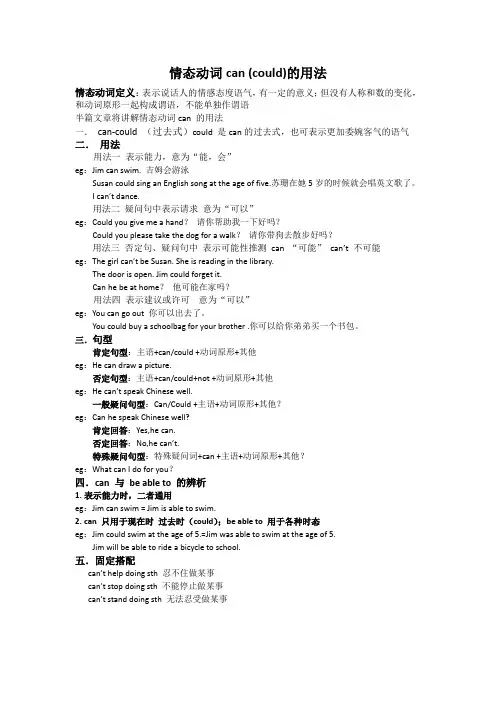
情态动词can (could)的用法情态动词定义:表示说话人的情感态度语气,有一定的意义;但没有人称和数的变化,和动词原形一起构成谓语,不能单独作谓语半篇文章将讲解情态动词can 的用法一.can-could (过去式)could 是can的过去式,也可表示更加委婉客气的语气二.用法用法一表示能力,意为“能,会”eg:Jim can swim. 吉姆会游泳Susan could sing an English song at the age of five.苏珊在她5岁的时候就会唱英文歌了。
I can’t dance.用法二疑问句中表示请求意为“可以”eg:Could you give me a hand?请你帮助我一下好吗?Could you please take the dog for a walk?请你带狗去散步好吗?用法三否定句、疑问句中表示可能性推测can “可能”can’t 不可能eg:The girl can’t be Susan. She is reading in the library.The door is open. Jim could forget it.Can he be at home?他可能在家吗?用法四表示建议或许可意为“可以”eg:You can go out 你可以出去了。
You could buy a schoolbag for your brother .你可以给你弟弟买一个书包。
三.句型肯定句型:主语+can/could +动词原形+其他eg:He can draw a picture.否定句型:主语+can/could+not +动词原形+其他eg:He can’t speak Chinese well.一般疑问句型:Can/Could +主语+动词原形+其他?eg:Can he speak Chinese well?肯定回答:Yes,he can.否定回答:No,he can’t.特殊疑问句型:特殊疑问词+can +主语+动词原形+其他?eg:What can I do for you?四.can 与be able to 的辨析1.表示能力时,二者通用eg:Jim can swim = Jim is able to swim.2.can 只用于现在时过去时(could);be able to 用于各种时态eg:Jim could swim at the age of 5.=Jim was able to swim at the age of 5.Jim will be able to ride a bicycle to school.五.固定搭配can’t help doing sth 忍不住做某事can’t stop doing sth 不能停止做某事can’t stand doing sth 无法忍受做某事六.could 表示更加委婉客气的请求1.委婉请求别人做某事(提出请求)句型:Could you (please) do sth? /Could you please not do sth?肯定回答:Yes,I can. /Sure./Certainly./Of course I can,/No problem.否定回答:Sorry,I can’t+原因/I’m afraid I can’t+原因eg:Could you please take the bag to the living room?Yes,sure.2.委婉请求别人允许自己做某事(征求许可)句型:Could I do sth?肯定回答:Yes,you can./Yes, please.否定回答:No,you can’t/I’m afraid you can’teg:Could I play with my best friend?I’m afraid you can’t.You have too much homework to do.。
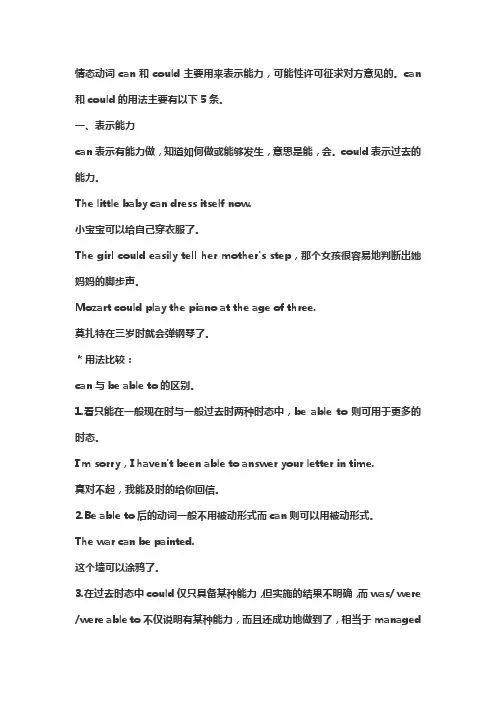
情态动词can和could主要用来表示能力,可能性许可征求对方意见的。
can 和could的用法主要有以下5条。
一、表示能力can表示有能力做,知道如何做或能够发生,意思是能,会。
could表示过去的能力。
The little baby can dress itself now.小宝宝可以给自己穿衣服了。
The girl could easily tell her mother's step,那个女孩很容易地判断出她妈妈的脚步声。
Mozart could play the piano at the age of three.莫扎特在三岁时就会弹钢琴了。
*用法比较:can与be able to的区别。
1.看只能在一般现在时与一般过去时两种时态中,be able to则可用于更多的时态。
I'm sorry,I haven't been able to answer your letter in time.真对不起,我能及时的给你回信。
2.Be able to后的动词一般不用被动形式而can则可以用被动形式。
The war can be painted.这个墙可以涂鸦了。
3.在过去时态中could仅只具备某种能力,但实施的结果不明确,而was/ were /were able to不仅说明有某种能力,而且还成功地做到了,相当于managedI talked with the boy for a long time and eventually I was able to make him believe me.我和那个男孩谈了很久,最终还是让他相信了我的话。
二、表示可能性1.用在肯定句中,表示理论上的可能性,指常有的行为或情形,意思是有时会……。
Tom can be really annoying.他们有时的确令人讨厌。
It can be very hot here in summer.这里夏天有时会很热。
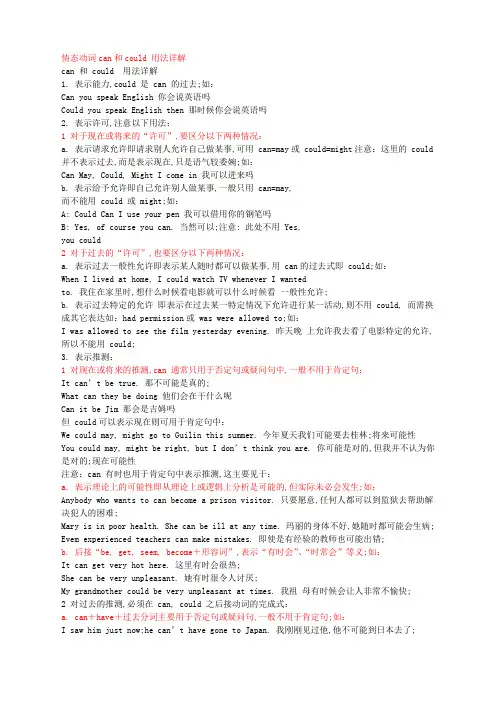
情态动词can和could 用法详解can 和 could 用法详解1. 表示能力,could 是 can 的过去;如:Can you speak English 你会说英语吗Could you speak English then 那时候你会说英语吗2. 表示许可,注意以下用法:1 对于现在或将来的“许可”,要区分以下两种情况:a. 表示请求允许即请求别人允许自己做某事,可用 can=may或 could=might注意:这里的 could 并不表示过去,而是表示现在,只是语气较委婉;如:Can May, Could, Might I come in 我可以进来吗b. 表示给予允许即自己允许别人做某事,一般只用 can=may,而不能用 could 或 might;如:A: Could Can I use your pen 我可以借用你的钢笔吗B: Yes, of course you can. 当然可以;注意: 此处不用 Yes,you could2 对于过去的“许可”,也要区分以下两种情况:a. 表示过去一般性允许即表示某人随时都可以做某事,用 can的过去式即 could;如:When I lived at home, I could watch TV whenever I wantedto. 我住在家里时,想什么时候看电影就可以什么时候看一般性允许;b. 表示过去特定的允许即表示在过去某一特定情况下允许进行某一活动,则不用 could, 而需换成其它表达如:had permission或 was were allowed to;如:I was allowed to see the film yesterday evening. 昨天晚上允许我去看了电影特定的允许,所以不能用 could;3. 表示推测:1 对现在或将来的推测,can 通常只用于否定句或疑问句中,一般不用于肯定句:It can’t be true. 那不可能是真的;What can they be doing 他们会在干什么呢Can it be Jim 那会是吉姆吗但 could可以表示现在则可用于肯定句中:We could may, might go to Guilin this summer. 今年夏天我们可能要去桂林;将来可能性You could may, might be right, but I don’t think you are. 你可能是对的,但我并不认为你是对的;现在可能性注意:can 有时也用于肯定句中表示推测,这主要见于:a. 表示理论上的可能性即从理论上或逻辑上分析是可能的,但实际未必会发生;如:Anybody who wants to can become a prison visitor. 只要愿意,任何人都可以到监狱去帮助解决犯人的困难;Mary is in poor health. She can be ill at any time. 玛丽的身体不好,她随时都可能会生病; Evem experienced teachers can make mistakes. 即使是有经验的教师也可能出错;b. 后接“be, get, seem, become+形容词”,表示“有时会”、“时常会”等义;如:It can get very hot here. 这里有时会很热;She can be very unpleasant. 她有时很令人讨厌;My grandmother could be very unpleasant at times. 我祖母有时候会让人非常不愉快;2 对过去的推测,必须在 can, could 之后接动词的完成式:a. can+have+过去分词主要用于否定句或疑问句,一般不用于肯定句;如:I saw him just now;he can’t have gone to Japan. 我刚刚见过他,他不可能到日本去了;Why does he know this Can someone have told him about it 他怎么知道会是哪个人告诉他了吗b. could+have+过去分词可用于肯定句、否定句或疑问句,主要用于:①表示对过去的推测,其意为“可能已经……”;如:He could have gone home. 他可能已回家了;Where could he have gone 他会到哪里去了呢He couldn’t have seen her there. 他不可能在那儿见到她;②表示过去没有实现的可能性即某事本来可以发生,但却没有发生,意为“本来可以……”;如:He could have told her, but he didn’t choose to. 他本来可以告诉她的,但他没有这样做;③用来委婉地责备某人过去应该做某事而没有去做,意为“本来应该……”;如:You could have helped him. 你本来应该来帮助他的;④表示“差点儿就要”;如:I could have died laughing. 我差点儿笑死了;。
情态动词can 和could 异同对于情态动词can 和could,后者是前者的过去形式,但是却不见得总是表示过去,具体用法如下:1. 表示“能力”,相当于汉语的“能够、可以、得以”等意思,在这种情况下,can 用于现在时态,could 用于过去时态,如:1)表示现在:I can carry both suitcases.我可以搬动两个箱子。
Can you remember the war?你还能记得那场战争吗2)表示过去:We could see the oil bleeding out from the joint.(那时)我们可以看出油从接缝处渗出。
It was so dark that we could see nothing.(当时)天太暗了,我们什么也看不见。
2. could比较委婉客气地提出问题或陈述看法,这时could和can没有时间上的差别。
如:—Could you let me have your passport? —看看你的护照好吗?—Yes, here it is. —行,这就是。
I could come earlier, if necessary. 如果必要我可以早点来。
3. 表示“猜测”,相当于汉语的“有可能”,一般不分时态,具体区别如下1) 表示理论上的可能性(即从理论上分析是可能的,但实际未必会发生),可用can(表现在)或could(表过去):E.g. He is in poor health. He can be ill at any time. 他身体不好,随时都可能会生病。
Even experts can make mistakes. 即使是专家也可能会出差错。
My mother could be very unpleasant at times. 我母亲有时候会让人非常不愉快。
2) 表示现实可能性,这包含两个方面的含义:一是指将来可能性,一是指现在的可能性,在这两种用法中,通常都不用can,但可用could (可以指现在,相当于may / might):E.g. 今年夏天我们可能要去日本。
情态动词c a n和c o u l d用法详解 Document number【980KGB-6898YT-769T8CB-246UT-18GG08】情态动词can和could 用法详解can 和 could 用法详解1. 表示能力,could 是 can 的过去。
如:Can you speak English 你会说英语吗Could you speak English then 那时候你会说英语吗2. 表示许可,注意以下用法:(1) 对于现在或将来的“许可”,要区分以下两种情况:a. 表示请求允许(即请求别人允许自己做某事),可用 can(=may)或could(=might)(注意:这里的 could 并不表示过去,而是表示现在,只是语气较委婉)。
如:Can [May, Could, Might] I come in 我可以进来吗b. 表示给予允许(即自己允许别人做某事),一般只用 can(=may),而不能用 could 或 might。
如:A: Could [Can] I use your pen 我可以借用你的钢笔吗B: Yes, of course you can. 当然可以。
(注意: 此处不用 Yes,you could)(2) 对于过去的“许可”,也要区分以下两种情况:a. 表示过去一般性允许(即表示某人随时都可以做某事),用 can的过去式(即could)。
如:When I lived at home, I could watch TV whenever I wantedto. 我住在家里时,想什么时候看电影就可以什么时候看 (一般性允许)。
b. 表示过去特定的允许( 即表示在过去某一特定情况下允许进行某一活动),则不用 could, 而需换成其它表达(如:had permission或 was [were] allowed to)。
如:I was allowed to see the film yesterday evening. 昨天晚上允许我去看了电影(特定的允许,所以不能用 could)。
情态动词can和could的用法区别_(1)表示能力(could为can的过去式,表过去的能力)Some of us can use the computer now, but we couldn t 10 years ago现在我们有些人会使用电脑,但十年前我们不会。
【知识拓展】①can与be able to都表示能力,在意义上没有区别。
但can只有一般式和过去式(could)两种形式,而be ableto则有更多的形式。
过去式:was/were able to将来式:shall/will be able to完成式:have/has been able to②如果要表达将来的能力,一般要用will/shall beable toThe baby will be able to walk in a few weeks.几周后这个婴儿就会走路了。
③be able to的过去式was/were able to可表示在过场合设法做成了某事,相当于managed to do,而could则无此意义。
The fire was very big, but most people were able to escape from it那场火很大,但多数人从火中逃了出来。
④can 和be able to不可同时使用。
(2)允许和许可。
You can park your car here.你可以把车停在这里。
Can I use your pen?我可以用你的钢笔吗?Yes,you can 是的,你可以No you can t.不,你不可以。
子这种语竟中,用could比用can的语气更委婉 ;can此时没有时间上的差别,could -般,肯定回答时要改用can。
Could I come here again tomorrow?我明天还能来这儿吗?一Yes,you can(或:No,I m afraid not.)是的,你可以。
can 与could 的用法
一、表示能力
(1)表示现在的能力,用can:
My sister can drive. 我妹妹会开车。
Everyone here can speak English. 这儿人人会说英语。
(2)表示将来的能力,通常不用can 或could,而用be able to
的将来时态:
I’ll be able to speak French in another few months. 再过几个月
我就会讲法语了。
One day people will be able to go to the moon on holiday. 总有
一天人们可以到月球上去度假。
但是,若表示现在决定将来是否有能力做某事,则可用
can:
Can you come to the party tomorrow? 你明天能来参加我们的
聚会吗?
(3)表示过去的能力,有时可用could,有时不能用could,具体应注意以下几点:
①若表示过去一般的能力(即想做某事就随时可做某事的能力),可用could:
Could you speak English then? 那时候你会说英语吗?
②若表示过去的特定能力(即在过去特定场合做某事的能力),则不能用could,而用was (were) able to do sth,或用managed to do sth,或用succeeded in doing sth 等。
He studied hard and was able to pass the exam. 他学习很努力,
所以考试能及格。
At last he succeeded in solving the problem. 他终于把那个问题
解决了。
【注】could 不用来表示过去特定能力通常只限于肯定句,否定句或疑问句中,它则可以表示过去特定的能力:
I managed to find the street, but I couldn’t find her house.我想
法找到了那条街,但没找到她的房子。
(前句为肯定句用managed to,不用could,后句为否定句,可用could)
另外,could 还可与表示感知的动词(如see, hear, smell, taste, feel, understand 等)连用表示的特定能力:
Looking down from the plane, we could see lights on the runway.从飞机上向下看,我们可以看见机场跑道上的点点灯火。
还有在间接引语中,could 也可表示过去特定的能力:
He said he could see me next week. 他说他下周能见我。
二、表示许可
(1)对于现在或将来的“许可”,要区分以下两种情况:
①表示请求允许(即请求别人允许自己做某事),两者均可用,但用could 语气更委婉:
Can [Could] I come in? 我可以进来吗?
【注】此时也可用may 或might,其中might 和could 均不表过去,只表委婉语气。
②表示给予允许(即自己允许别人做某事), 一般只用can,而不用could:
“Could [Can] I use your pen? ” “Yes, of course you can.” “ 我可以借用你的钢笔吗?”“当然可以。
”(不能说Yes, you could.)
(2)对于过去的“许可”,也要区分以下两种情况:
①表示过去一般性允许(即表示某人随时都可以做某事),用can 的过去式could:
When I lived at home, I could watch TV whenever I wanted to.我住在家里时, 想什么时候看电影就可以什么时候看。
(一般性允许)
②表示过去特定的允许(即表示在过去某一特定情况下允许进行某一特定的活动),则不用could,而需换成其他表达(如had permission, was [were] allowed to):
I was allowed to see the film yesterday evening. 昨天晚上允许我去看了电影。
(特定的允许,不能用could)
三、表示推测
(1)对现在或将来的推测,两者均可用,但can 通常只用于否定句或疑问句中,一般不用于肯定句,而could 则可用于肯定句、否定句和疑问句:
It can’t be true. 那不可能是真的。
What can they be doing? 他们会在干什么呢?
We could go there this summer. 今年夏天我们可能要去那儿。
(将来可能性)
You could be right, but I don’t think you are. 你可能是对的,
但我并不认为你是对的。
(现在可能性)
【注】can 有时也用于肯定句中表示推测,这主要见于:
①表示理论上的可能性(即从理论上看是可能的,但实际未必会发生):
Even experienced teachers can make mistakes. 即使是有经验的
教师也可能出错。
②用于含有only 等表示限制的肯定句:(from)
“Who is that at the door? ” “It can only be the postman.”“门外是谁?”“只能是邮递员。
”
③后接“be (get, seem, become)+形容词”,表示“有时会”、“时常会”等:
It can get very hot here. 这里有时会很热。
She can be very unpleasant. 她有时很令人讨厌。
(2)对过去的推测,必须在can, could 之后接动词的完成式。
但此时can 仍只用于否定句或疑问句,不用于肯定句;而could 则
可用于各种句型:
He can’t [couldn’t] have seen her there. 他不可能在那儿见到她。
He could have gone home. 他可能已回家了。
Who could have taken it?是谁把它拿走了呢?
I do not see how I could have done otherwise. 我看不出那时我
还能有别的做法。
She could not have been more than sixteen. 那时她不可能超过
十六岁。
I couldn’t have won, so I didn’t go in for the race. 我不可能获胜,因此我没参赛。
【注】could 后接动词的完成式,除表示对过去的推测外,
还有以下用法(不用can):
①表示过去没有实现的可能性(即某事本来可以发生,却没
发生):
He could have told her, but he didn’t choose to. 他本来可以告诉
她的,但他却没有。
I could have lent you the money. Why didn’t you ask me? 我本
来可以借这笔钱给你的。
你为什么不问我?
②用来委婉地责备某人过去应该做某事而没有去做:
You could have been a little more considerate. 你本可考虑得更周到些的。
You could ask me before you use my phone. 你打电话之前可以问我一声。
You could have helped me why did you just sit and watch? 你本可帮助我的,为什么只坐在一旁瞧着?
③表示“差点儿就要”:
I could have died laughing. 我差点笑死了。
I was so angry I could have killed him. 我是那样生气,差点把他杀了。
She felt miserable. She could have cried. 她感到很痛苦,她差点哭了。